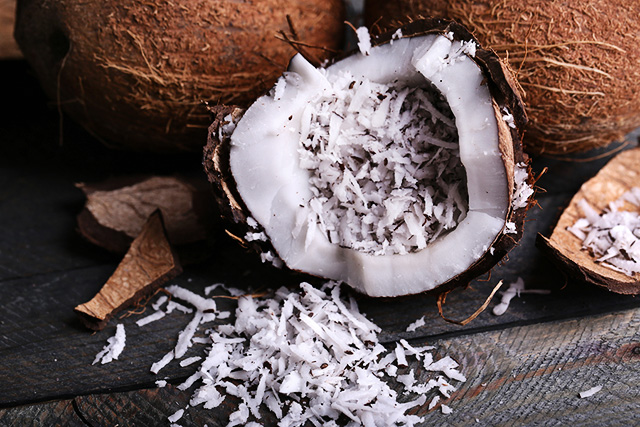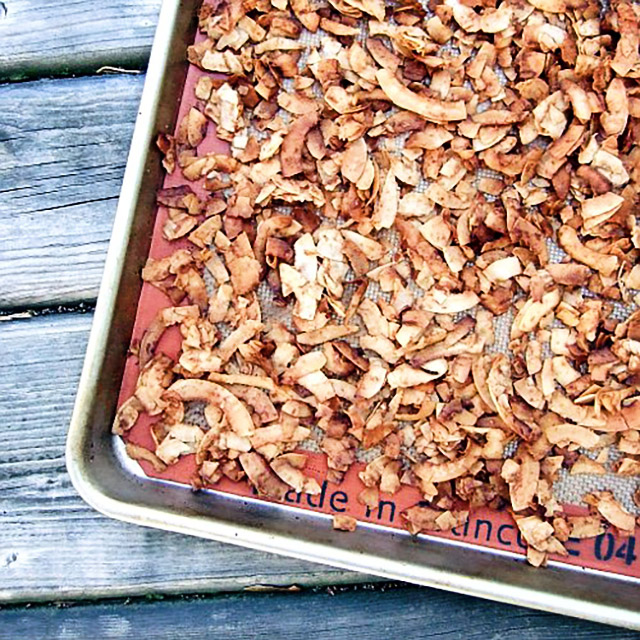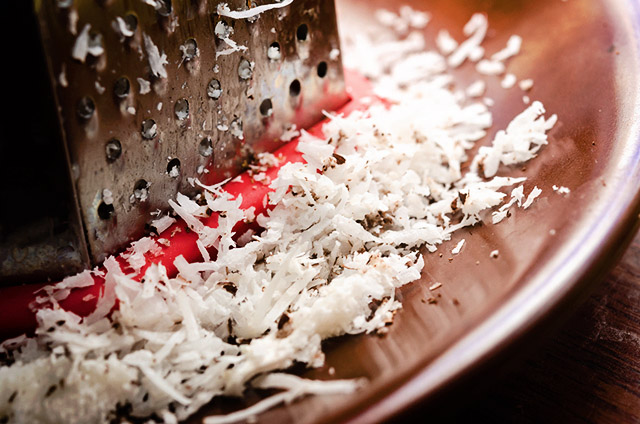Each month FBC member and certified nutritionist, Sondi Bruner, helps us figure out how to eat a healthy diet without needing a science degree! This month, she shows us just what to do with coconut and all its products.

You might not have considered this before, but there are a lot of different ways to enjoy coconut. A lot. Coconut products are a charismatic combination of flavour and nutrient density; I've encountered very few people who are coconut haters — if you're one of them, I won't hold it against you.
Each coconut product has its own special nutrient powers and charm, but from a general health perspective they are:
- Rich in healthy fats that are great for digestion, immunity and cardiovascular health
- High in minerals, protein and fibre, which makes them great for lowering blood sugar
- Satisfying and satiating, which can encourage weight loss
- Allergen-friendly and nut-free (coconut is actually a fruit, not a nut, so it's safe for people with tree nut allergies, as long as there is no cross-contamination with nuts)
So without further ado, let's get to it and talk about some of the common coconut products you'll see at the grocery store: coconut oil, coconut milk, coconut meat, coconut water, shredded coconut and coconut flour.
Coconut Oil

What Is it?
There are a couple of different types of coconut oil you'll find on store shelves: refined coconut oil and unrefined coconut oil (the latter is often labelled as 'virgin' or 'extra virgin' coconut oil).
The refined version is derived from something called 'copra,' or dried coconut kernels, and often producers will need to use high heat or solvents to extract the oil from the coconut. Unrefined or virgin coconut oil is created with minimal to no heat using one of two methods: quick drying or wet milling. In the first method, fresh coconut meat is dried and then the oil is gently pressed out. For the latter method, coconut milk is pressed out of the fresh coconut meat and then the oil is separated from the water.
So which is better? Generally, I choose unrefined coconut oil because I like to buy ingredients that are as raw as possible so I can then control how I treat, process or cook them. However, refined coconut oil isn't necessarily a bad choice if the brand you select doesn't use a massive amount of chemicals in processing it. For more information about how to choose a coconut oil, check out this resource.
Health Benefits
Coconut oil is a saturated fat and in general, saturated fats have been criticized in the last 30 years or so for being "bad" and contributing to heart disease. However, a glut of recent research has shown the gospel about saturated fats that we grew up with was actually incorrect.
In truth, there are so many amazing health benefits to coconut oil, including:
- Coconut oil is rich in lauric acid, which accounts for about 50 percent of its composition. Lauric acid is anti-microbial and anti-bacterial, which means it can help us fight infections. Lauric acid isn't found that often in nature, though it is found in human breast milk and the milk of cows and goats.
- Most of the fats in coconut oil are medium-chain fatty acids, and this particular size of fat is easily digested and immediately used for energy, rather than being stored as fat. This makes it a healing oil for people with digestive issues or for those who are trying to lose weight.
- Coconut oil's medium-chain fats help with fat-burning, weight loss and help you drop inches from your waist.
- Coconut oil plays a positive role in cardivascular disease. A recent review of 21 different studies concluded that it can improve blood lipid profiles and reduce the risk factors for heart disease.
- Additional research indicates that coconut oil can positively impact the brain and nervous system, potentially preventing or managing Alzheimer's disease, and it may even have stress-reducing effects.
How to Use Coconut Oil
If you've been reading these columns regularly, you probably already know that I love, love, love coconut oil. It's one of my favourite fats to use for a number of reasons: I love its coconutty flavour, its high smoke point for high-heat cooking and the way it can replicate butter in a wide variety of vegan and dairy-free recipes.
I regularly use coconut oil 1:1 whenever another saturated fat, such as butter or shortening, is called for. I dollop coconut oil in pans and pots for sautéeing, I spread it on toast with nut butter, I incorporate it into homemade chocolate, add it into smoothies or warm elixirs, drizzle it on oatmeal and mix it into baked goods like cookies, muffins, granola bars, and more.
The beauty of coconut oil is that it's liquid when warm, but solidifies in cooler temperatures. This makes it amazing for anything you want to dip in chocolate or if you'd like to create a "chocolate shell" for frozen desserts. It's also a good option for vegan recipes that replicate dairy, like vegan sour cream and vegan cream cheese, as it really helps create a firm texture.
Also, coconut oil is amazing for homemade beauty care products. Derivatives of coconut are commonly used in beauty care lotions and potions — why not go straight to the source? Apply coconut oil directly to the skin as a moisturizer, or incorporate it into lip balm or deodorant recipes.
Coconut Milk

Coconut milk is made by grating coconut meat and soaking it in water, then squeezing it through a cheesecloth or strainer to make the milk. There are varying degrees of thickness, as the coconut pulp strained out can also be soaked in water and strained again for a thinner consistency.
Canned coconut milk is usually a mix of coconut milk, water and some kind of stabilizer like guar gum or xanthan gum. You can also make coconut milk yourself, either by mixing shredded coconut with water or blending coconut meat with water.
Health Benefits
The health benefits of coconut milk are very similar to coconut oil; it's also a great source of lauric acid and the medium-chain fats that assist with weight loss and help prevent cardiovascular disease. Also, since coconut milk is vegan and dairy free, it's an amazing substitute for those with dairy allergies.
How to Use Coconut Milk
Coconut milk's thick, creamy texture and sweet flavour makes it a perfect substitute for any dairy-based milk. It's incredible in curries, soups, hot chocolate, baked goods, homemade ice cream, smoothies, pies and tarts, coconut rice and the oh-so-delectable coconut whipped cream.
Coconut Meat

Coconut meat (and coconut water, below) are the most whole-food forms of coconut, as you can crack open a coconut and drain the water and scoop out the flesh. Truth be told, I don't use coconut meat often. Here in Vancouver, it's easy to find inexpensive coconuts, but then you've got to breach the brown, fuzzy layers with mallets or hammers. Considering I regularly walk into door frames and walls, slamming a hammer into a relatively small object in my hand seems like a poor idea.
It's also possible to buy prepared coconut meat where all of the hammering and chiseling are already done for you. I've purchased coconut meat in this form occasionally, especially when I was following a raw food diet and many recipes called for it, but it can be expensive.
Health Benefits of Coconut Meat
In addition to the immune-boosting and heart-healthy benefits mentioned earlier, coconut meat contains protein, a range of minerals like iron, potassium and magnesium, and is a source of fibre, which is great for the digestive tract.
How to Use Coconut Meat

Fresh coconut meat can be used in a variety of ways: toss it into a smoothie or curry, blend it into coconut milk or ferment your own coconut yogurt, slice it and dry it into "coconut chips," or consume it fresh as a snack.
Coconut Water

Coconut water is typically derived from young coconuts, as they contain higher amounts of water compared to mature coconuts. There's been a lot of marketing hype slapped on coconut water and, while the claims about coconut water itself are true, often the products that shout them from the rooftops don't actually confer those health benefits.
Health Benefits of Coconut Water
Coconut water is a natural source of electrolytes, containing high amounts potassium, sodium, calcium and magnesium, making it a much better post-workout option to replace electrolytes than those neon-coloured sports drinks. Research also shows that it can help lower blood pressure and has anti-bacterial properties, and animal research shows promise with respect to Alzheimer's and diabetes.
As I mentioned, the food industry has co-opted the health benefits of coconut water for profit. The issue with most of the coconut water products you'll see on shelves is they're pasteurized, which removes the beneficial nutrients, plus they're often infused with added sugars to make the product more palatable.
So while those boxed coconut water products are a better alternative to pop or conventional sports drinks, they aren't going to offer you the nutrient value you'd glean from fresh, raw and unpasteurized coconut water.
How to Use Coconut Water
Coconut water has a naturally sweet taste, so you can essentially use it in any context where you'd use normal water. To retain the health benefits, smoothies, juices and raw desserts are the best way to go (other than drinking it straight up); otherwise, you could also use it in baking, soups or stews.
Shredded Coconut

Shredded or desiccated coconut comes from coconut meat that has been grated or shredded and then dried. You can find both sweetened and unsweetened versions, and flakes in a variety of sizes.
Health Benefits of Shredded Coconut
Shredded coconut is rich in protein, fibre, iron and of course those beneficial fats. I prefer to use unsweetened coconut; we have enough sources of added sugars in our diets and I'd rather add my own sweeteners to my food.
How to Use Shredded Coconut

Toss shredded coconut into a variety of baked goods (cookies, muffins, breads, cakes, granola bars, granola, coconut macaroons), sprinkle it on cereal, porridge, fruit or yogurt, incorporate it into your fruit crumble topping, use it as grain-free breadcrumbs for tofu, fish or meat, or add it to your smoothies, ice cream or hot chocolate. I also like to take the large, wide-flaked coconut and make coconut chips.

And have you ever tried coconut butter? Like any nut or seed butter, coconut butter is made by blending shredded coconut in a food processor until it's smooth and creamy. Use however you would enjoy your favourite nut butter! You can even mix nuts and coconut together to make an incredible coconut-nut butter.
Coconut Flour

When coconut meat has been blended and strained for coconut milk, the pulp is dried into coconut flour. This gluten-free and grain-free flour is widely used in Paleo dishes and low-carb diets.
Health Benefits of Coconut Flour
Coconut flour is a concentrated source of fibre, almost double the amount over wheat bran. Also, since it's grain-free, it's suitable for a number of healing diets that eliminate the use of grains.
How to Use Coconut Flour
Coconut flour is wonderful in a variety of baked goods or as a flour for breading. Its high fibre content means you'll have to use more liquid, as the coconut flour just soaks up liquid like crazy. For every tablespoon of coconut flour you add to a recipe, you'll need to use an extra tablespoon of liquid as well. (For more about using coconut flour and other gluten-free flours, consult this gluten-free flour guide.)
What are your favourite ways to use coconut? Please share your recipes in the comments below!
More Reading
Check out more of Sondi’s Allergen-Friendly Guides and Recipe Remixes for great ideas on revamping your favourite recipes to make them allergen friendly or to find out more about allergen-friendly ingredients!
- What To Do with Hemp and Chia
- How To Feed Vegetarians and Vegans
- Your Complete Guide To NaturalSweeteners
- Organic Food: Worth the Cost or Marketing Hype?
Sondi Bruner is a holistic nutritionist, freelance writer and food blogger. She educates people who follow allergen-friendly diets about how to eat simply, deliciously and safely, allowing them to rediscover the pleasure of food. When she’s wearing her writer’s hat, she works with natural health brands to create content that will help their customers live fulfilling, healthful lives. Find out more at www.sondibruner.com. Or you can follow Sondi on Facebook or Twitter.








What a comprehensive article! Keep in mind that fresh, homemade coconut milk is often a lot healthier than the canned, store bought versions. It tastes a whole lot better too!
Nice Information